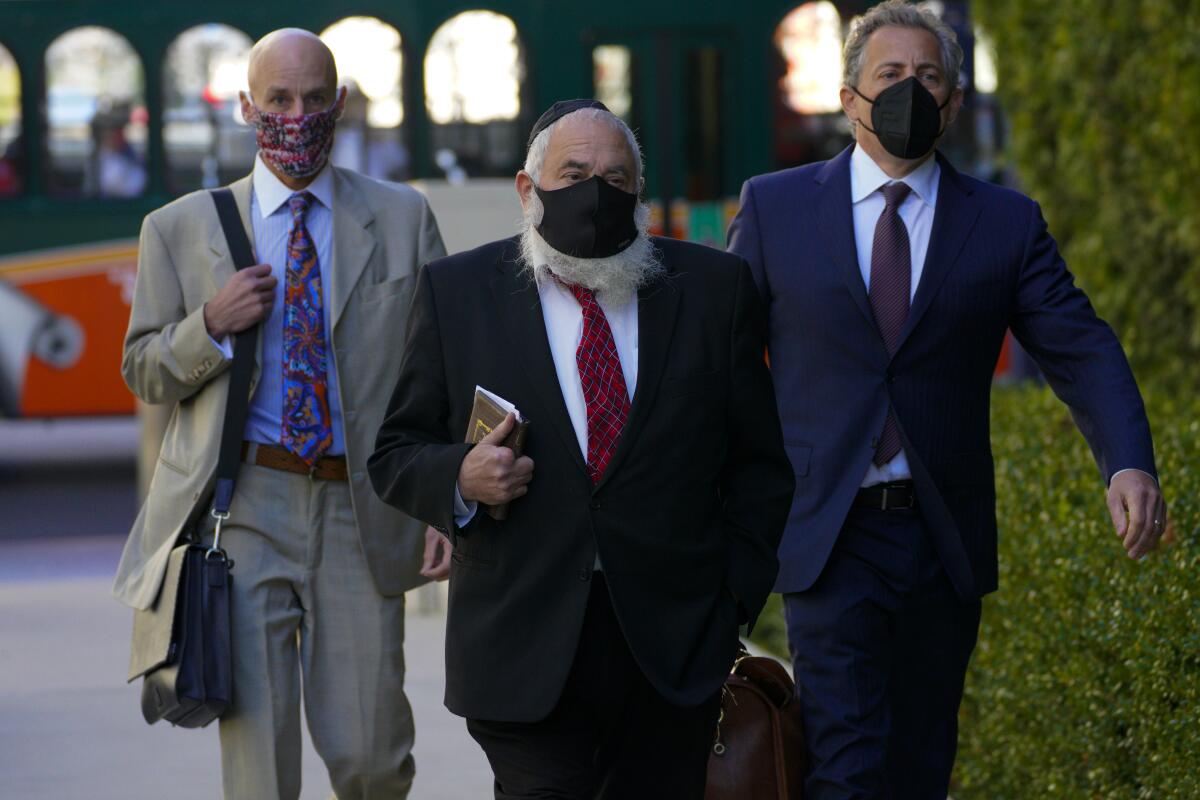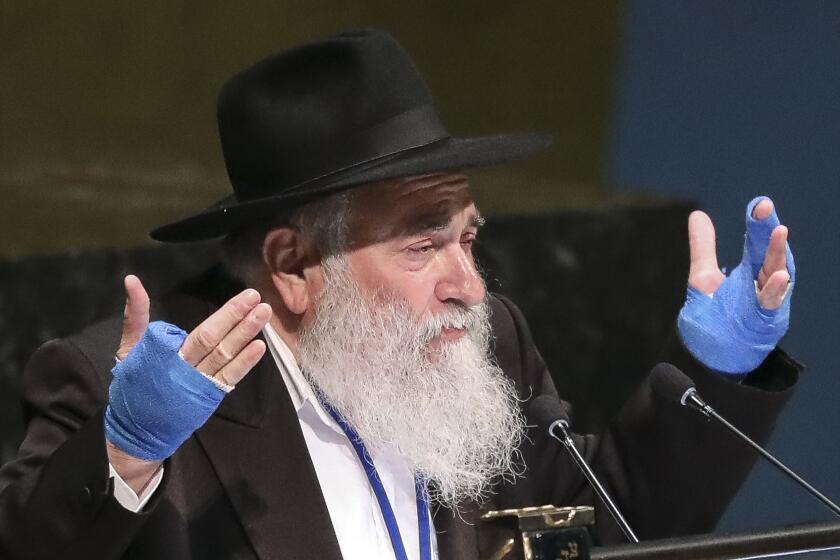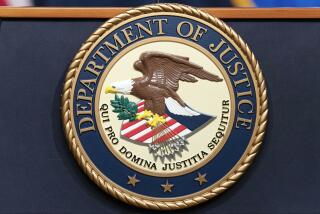Rabbi who was shot in Poway synagogue attack is sentenced to prison for fraud

- Share via
SAN DIEGO — The founding rabbi of a Poway synagogue who rose to national prominence after being wounded in an antisemitic shooting, and was then exposed as the perpetrator of multimillion-dollar fraud schemes, was sentenced Tuesday to 14 months in prison.
In a rare agreement under even rarer circumstances, both prosecutors and defense attorneys had recommended home confinement rather than time behind bars for Yisroel Goldstein. They cited his leadership in the weeks following the 2019 attack on Chabad of Poway, the immense physical and emotional trauma the former rabbi continues to battle, and his cooperation in the FBI’s fraud investigation.
But the judge rejected that punishment as not appropriate given the severity of the crimes.
“You not only committed this offense yourself but you took a lot of people with you,” U.S. District Judge Cynthia Bashant told Goldstein, 60.
“I think it’s important to send a message to the community, and I think it’s important to send a message to you,” she added.
Goldstein must also pay about $2.8 million in restitution, an amount shared with several other defendants who were prosecuted as participants in the financial cons.
Court records provide a detailed look at a sweeping years-long fraud scheme orchestrated by former Poway Chabad Rabbi Yisroel Goldstein.
He must self-surrender by Feb. 23, although he could appeal for a later date if COVID-19 continues to surge. The judge agreed to recommend he be housed at a medium-security federal prison in Otisville, N.Y., which his defense attorney said is known to accommodate observant Jews.
As a rabbi in the Chabad movement — which practices Orthodox Judaism but is also known for its welcoming nature — Goldstein counted on the generosity of his congregation for his salary. He found other ways to supplement his income.
The FBI says Goldstein had his hand in a number of fraudulent schemes exploiting tax loopholes, corporate benevolence and government grant assistance.
Prosecutors said he personally earned at least $620,000 from the conspiracies.
The most prevalent of the schemes is known as the “90/10” fraud. Donors regularly made large charitable contributions to Chabad of Poway or one of its affiliated nonprofits, to be written off their taxes. But instead of the money going to the organizations, Goldstein secretly funneled 90% of it back to the donor, keeping 10% for himself. One donor got his donation returned in the form of $1 million in gold, prosecutors said.
At least a dozen people took Goldstein up on the tax-evasion scheme, resulting in at least $1.5 million in tax losses to the Internal Revenue Service, according to prosecutors.
In one variation on the scheme, donors would solicit their companies for matching charitable contributions. Goldstein would then return all of the original amount to the donor while keeping the corporation’s matching funds. The corporations were given fraudulent donation receipts, and many took the tax deductions.
At least three Fortune 500 companies — Qualcomm, Johnson & Johnson and Northrop Grumman — were defrauded out of nearly $145,000 total.
In deciding the sentence, the judge said she was struck by the number of people whom Goldstein dragged down with him.
“Many of the individuals thought when they were committing their offense to benefit Chabad, the academy or synagogue or the organization in general, when in fact it was really just to benefit you,” Bashant said. “It was for your personal benefit and your own greed, and I can’t ignore that fact.”
In a letter to the judge and further statements in court, Goldstein expressed deep remorse.
“I beg for mercy to accept my repentance and allow me to right the wrongs and be able to live out the rest of my life with remorse and to be given the chance to do whatever I can to help others to the best of my ability,” he told the judge Tuesday.
Goldstein, who first launched the synagogue in Rancho Bernardo in the 1980s, was long known as a leader in the local Jewish community. But he became an international figure, delivering a powerful message against hate, when he and three members of his congregation were shot in an antisemitic attack on April 27, 2019. Congregant Lori Gilbert-Kaye, whom he described in court as like a sister, was killed.

The gunman, John T. Earnest, now 22, was recently sentenced to two life terms in prison on both state and federal charges.
Bullets struck the rabbi in both hands, causing him to lose a finger and leaving another severely injured.
Still, in the hours and days after the attack he delivered words of hope — including an impromptu speech while standing on a chair right after the shooting and appearances at the White House and United Nations.
No one else knew at the time that he was the subject of a fraud investigation that had been open for more than a year.
Goldstein discovered he was being investigated in 2018 when the FBI searched his home and office. He immediately warned one co-conspirator of the investigation but soon after began cooperating with agents.
Goldstein stepped down as rabbi in November 2019, citing exhaustion. News of his crimes wasn’t made public until the following summer, when he pleaded guilty to tax and wire fraud.
His misdeeds came to the attention of the FBI as agents were investigating a separate Ponzi scheme run by a San Diego real estate agent, Alexander Avergoon. The rabbi kept popping up in Avergoon’s financial entanglements, and soon agents uncovered other long-running frauds.
With help from Avergoon, Goldstein applied for $937,000 in relief and grant money over the years, falsely claiming the funds were needed to upgrade security at the synagogue, repair nonexistent damage caused by 2007 wildfires, implement special programming or upgrade his living quarters.
The funds were awarded by federal and state emergency agencies and a private foundation out of Beverly Hills. The vast majority was pocketed.
Hannah Kaye, daughter of the congregant killed in the shooting, attended the hearing Tuesday with her aunts to bear witness to Goldstein’s fate.
“We hold him partially responsible for my mother’s murder as a result of him stealing security grants meant to protect the synagogue that were instead used for his own personal gain,” Kaye said in an interview.
She said she was taken aback by sentimental comments Goldstein made in court about his close relationship with her family.
“I believe that was an exploitive and manipulative tactic used as a way to elevate his victim status,” she said.
Avergoon also helped Goldstein recruit donors for the “90/10” fraud, as well as apply for mortgages and a construction loan on false claims. In turn, Goldstein falsely certified that Avergoon and his associates completed community service hours at Chabad as part of a court order.
Avergoon was sentenced by the same judge Monday to more than five years in prison for the schemes and an unrelated $12-million real estate Ponzi scheme in which investors thought they were buying into rental property.
To prepare for sentencing, Goldstein took the unusual step of producing a documentary-like video to submit to the court to tell his side of the story.
He dates his criminal actions to around 2010, when many of Chabad of Poway’s major philanthropists had either moved away or died, and the full weight of the administration of the synagogue and its organizations fell on his shoulders. He said he was triggered by memories of the financial struggles of his boyhood as the ninth of 10 children in Brooklyn, and of the lean early days planting the synagogue in northern San Diego County.
The fraud started small as a salve to the rising anxiety that he was battling about his ability to support himself and his growing family, he said.
“I have fallen prey and worshiped the Golden Calf of money,” Goldstein wrote to the judge in a letter, referring to an Old Testament idol. “I have let myself down and everything that I have taught, and everything that I have preached for 40 years, and allowed myself to be seduced to a very dark place, allowing the power of money to get the better part of my soul.”
However, the investigation found that some of Goldstein’s schemes date back as early as the 1980s, including a long-running conspiracy to help at least one man shield from taxes more than $2 million in fake donations.
Goldstein is accused of helping his own brother in New York also hide $700,000 in income by depositing money in Chabad bank accounts, with the then-rabbi getting a cut. Mendel Goldstein has pleaded guilty and will be sentenced next month.
More to Read
Sign up for Essential California
The most important California stories and recommendations in your inbox every morning.
You may occasionally receive promotional content from the Los Angeles Times.












